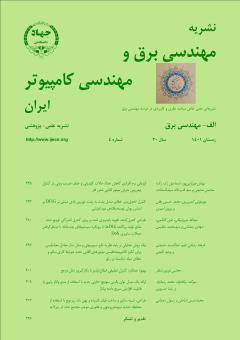بهبود عملکرد کنترل تطبیقی ابطالناپذیر با بهکارگیری مدل مرجع
محورهای موضوعی : مهندسی برق و کامپیوتر
1 - دانشكده مهندسي برق، دانشگاه شهید بهشتی
کلید واژه: کنترل تطبیقی ابطالناپذیر, کنترل دادهمحور, بهروزرسانی بانک کنترلی, کنترل نظارتی,
چکیده مقاله :
کنترل تطبیقی ابطالناپذیر، رویکرد جدیدی در کنترل نظارتی است که تنها با توجه به دادههای ورودی- خروجی از سیستم و یک بانک کنترلی، انتخاب کنترلکننده پایدارساز را تضمین میکند. تنها شرط لازم برای اثبات پایداری، وجود یک بانک کنترلکننده طراحیشده از قبل است که حداقل یک کنترلکننده از کنترلکنندههای موجود در بانک کنترلی، پایدارساز باشد. انتخاب کنترلکنندهها توسط ناظر بر اساس تابع هزینهای است که با دادههای ورودی- خروجی سیستم محاسبه میشوند. در این روش، عملکرد سیستم کنترلی محدود به کنترلکنندههای موجود در بانک کنترلی است. در این مقاله با استفاده از معرفی ایده ابطال عملکرد بانک کنترلی موجود، در کنار مفهوم ابطال پایداری کنترلکننده فعال، بهروزرسانی بانک کنترلی انجام میشود. برای ابطال عملکرد بانک کنترلی، ساختار مدل مرجع برای ارزیابی عملکرد سیستم کنترلی پیشنهاد شده است. بعد از ابطال عملکرد، یک کنترلکننده جدید بر اساس دادههای سیستم و بدون استفاده از هیچ مدلی طراحی شده و کنترلکننده جدید به بانک کنترلکنندهها افزوده میشود. برای طراحی کنترلکننده، یک مسأله ناتساوی ماتریسی خطی حل میشود. در این مقاله از هیچ مدلی از سیستم استفاده نشده و روش ارائهشده کاملاً بدون مدل و دادهمحور است. نتایج شبیهسازی، بهبود عملکرد روش پیشنهادی را نسبت به سایر روشها بر روی یک سیستم رایج که در ارزیابی عملکرد سیستمهای کنترل تطبیقی مقاوم استفاده میشود، نشان میدهند.
Unfalsified adaptive control is a new approach in supervisory control that ensures the selection of a stabilizing controller from a control set based on the system input-output data. A prerequisite for ensuring stability is the existence of a pre-designed controller set that contains a stabilizing controller. The supervisor selects the controller based on the cost function calculated with the system input-output data. In this method, the control system performance is restricted to the controllers of the control set. In this paper, the controller set update is performed by introducing the concept of performance falsification along with the stability falsification of the active controller. To falsify the performance of the controller set, the structure of the model reference is proposed to evaluate the performance of the control system. In case of performance falsification, a new controller is designed and added to the controller set based on system data and without using any model. To design the controller, a linear matrix inequality problem is solved. In this paper, no system model is used, and the presented method is completely model-free and data-oriented. The simulation results show the performance improvement of the proposed method compared to other methods in a standard robust adaptive benchmark system.
[1] A. S. Morse, D. Q. Mayne, and G. C. Goodwin, "Applications of hysteresis switching in parameter adaptive control," IEEE Trans. on Automatic Control, vol. 37, no. 9, pp. 1343-1354, Sep. 1992.
[2] H. Jin and M. G. Safonov, "Unfalsified adaptive control: controller switching algorithms for nonmonotone cost functions," International J. of Adaptive Control and Signal Processing, vol. 26, no. 8, pp. 692-704, Aug. 2012.
[3] R. Wang, A. Paul, M. Stefanovic, and M. G. Safonov, "Cost detectability and stability of adaptive control systems," International J. of Robust and Nonlinear Control: IFAC-Affiliated J., vol. 17, no. 5-6, pp. 549-561, Mar. 2007.
[4] M. G. Safonov and T. C. Tsao, "The unfalsified control concept: a direct path from experiment to controller," In: B. A. Francis and A.R. Tannenbaum, (eds.) Feedback Control, Nonlinear Systems, and Complexity. Lecture Notes in Control and Information Sciences, vol. 202. Springer, Berlin, Heidelberg pp. 196-214, 1995.
[5] S. Baldi, G. Battistelli, E. Mosca, and P. Tesi, "Multi-model unfalsified adaptive switching supervisory control," Automatica, vol. 46, no. 2, pp. 249-259, Feb. 2010.
[6] S. Baldi, G. Battistelli, E. Mosca, and P. Tesi, "Multi-model unfalsified adaptive switching control: test functionals for stability and performance," International J. of Adaptive Control and Signal Processing, vol. 25, no. 7, pp. 593-612, Jul. 2011.
[7] G. Battistelli, J. P. Hespanha, E. Mosca, and P. Tesi, "Model-free adaptive switching control of time-varying plants," IEEE Trans. on Automatic Control, vol. 58, no. 5, pp. 1208-1220, May 2013.
[8] S. V. Patil, Y. C. Sung, and M. G. Safonov, "Unfalsified adaptive control for nonlinear time-varying plants," IEEE Trans. on Automatic Control, vol. 67, no. 8, pp. 3892-3904, Aug. 2022.
[9] م. نوری منظر و ع. خاکی صدیق، "کنترل نظارتی پیشبین ابطالناپذیر مدل چندگانه،" مجله کنترل، جلد 9، شماره 2، صص. 24-14، تابستان 1394.
[10] B. Sadeghi Forouz, M. Nouri Manzar, and A. Khaki-Sedigh, "Multiple model unfalsified adaptive generalized predictive control based on the quadratic inverse optimal control concept," Optimal Control Applications and Methods, vol. 42, no. 3, pp. 769-785, May/Jun. 2021.
[11] M. Nouri Manzar, G. Battistelli, and A. Khaki-Sedigh, "Input-constrained multi-model unfalsified switching control," Automatica, vol. 83, pp. 391-395, Sept. 2017.
[12] M. Nouri Manzar and A. Khaki-Sedigh, "Self-falsification in multimodel unfalsified adaptive switching control," International J. of Adaptive Control and Signal Processing, vol. 31, no. 11, pp. 1723-1739, Nov. 2017.
[13] S. I. Habibi, A. Khaki-Sedigh, and M. Nouri Manzar, "Performance enhancement of unfalsified adaptive control strategy using fuzzy logic," International J. of Systems Science, vol. 50, no. 15, pp. 2752-2763, 2019.
[14] S. I. Habibi and A. Bidram, "Unfalsified switching adaptive voltage control for islanded microgrids," IEEE Trans. on Power Systems, vol. 37, no. 5, pp. 3394-3407, Sep. 2022.
[15] A. Hokmabadi and M. Khodabandeh, "Unfalsified control design using a generalized cost function for a quadrotor," Aircraft Engineering and Aerospace Technology, vol. 93, no. 2, pp. 241-250, 2021.
[16] C. de Persis and P. Tesi, "Formulas for data-driven control: stabilization, optimality, and robustness," IEEE Trans. on Automatic Control, vol. 65, no. 3, pp. 909-924, Mar. 2019.
[17] H. Kwakernaak, The Polynomial Approach to H∞-Optimal Regulation, in H∞-Control Theory, Springer, pp. 141-221, 1991.
[18] M. Grant and S. Boyd, CVX: Matlab Software for Disciplined Convex Programming, Version 2.2, 2020.

